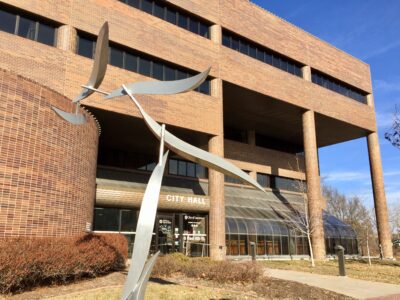LMH shares plans for mental health crisis stabilization center with Douglas County Commission

Lawrence Memorial Hospital
Lawrence Memorial Hospital plans to open a mental health crisis stabilization center this year near its emergency room, Douglas County commissioners were told Wednesday.
LMH President Russ Johnson made the announcement at the County Commission’s first work session on the proposed mental health crisis intervention center in seven months. The work session was billed as a discussion on the wraparound services patients would need before and after they received treatment at the crisis intervention center proposed for a site just north of Second Street, across from Bert Nash Community Mental Health Center. Douglas County voters would have to approve a bond referendum before that center could be built.
The LMH crisis stabilization center would be constructed in a 1,500-square-foot area adjacent to the LMH emergency center and would have a private entry on the hospital’s east side.
Joining the hospital president in presenting LMH’s plans to commissioners was Bert Nash CEO David Johnson. Both men said the hospital’s crisis stabilization center would not be a replacement for the proposed crisis intervention center. It would not have the detoxification ward included in conceptual plans Treanor Architects developed last year for the crisis intervention center, and it would not offer substance abuse programming or outpatient services.
Russ Johnson and Karen Shumate, LMH chief operating officer, said the hospital’s crisis center would include four private rooms and a common calming area with recliners in which a patient could receive medication or recover from a less serious crisis.
The hospital is working with Treanor Architects on the center’s design, Shumate said. The hospital board has made it a priority to open the facility, which would have the goal of reducing the number of county residents needing hard-to-get beds at Osawatomie State Hospital, she said. The crisis stabilization center should be completed by September, she said.
“Programming should be in place before the facility is open, because we’re already working with Bert Nash on that,” she said.
Russ Johnson said the center was an extension of the emergency mental health services the hospital was already providing.
“Our conversation was that, irrespective of the long-term direction we go as a community, there is no one organization that is going to solve mental health needs, even one that’s focused on it like Bert Nash,” he said. “We thought we could do a better job of focusing on what we (LMH) were doing, and that was something we could do relatively immediately.”
The goal was to improve the experience for those seeking crisis mental health care at LMH and provide the opportunity to give them a gentle handoff to the services Bert Nash offers across Maine Street, the LMH president said.
David Johnson said he didn’t know how or whether the hospital’s facility could alter plans for the county’s proposed crisis intervention center. Conceptual plans for the center Treanor Architects shared with commissioners in July included a 16-bed longterm inpatient ward.
The LMH facility would help to gauge the demand for emergency services in the community, he said.
The County Commission approved a contract in August to have Treanor develop schematic plans for the crisis intervention center. That would be put on hold with the LMH announcement so that the county could assess the LMH facility’s impact, Assistant County Administrator Sarah Plinsky said.
In another announcement, Shannon Oury, executive director of the Lawrence-Douglas County Housing Authority, told commissioners that if the crisis intervention center were built, her agency would build apartments immediately to the east, which would be reserved for those with mental health issues. Although details such as the number of units weren’t in place, the agency’s board supported the project, and there were no issues with the city or neighbors, she said.
“This is exactly the kind of housing we want to build for a population we want to serve,” she said.
Commissioners said the announcements indicated the county and community partners were working toward putting in place a continuum of care needed to help those in the county with mental health concerns. They noted the crisis intervention center was always viewed as part of a larger overall solution.



